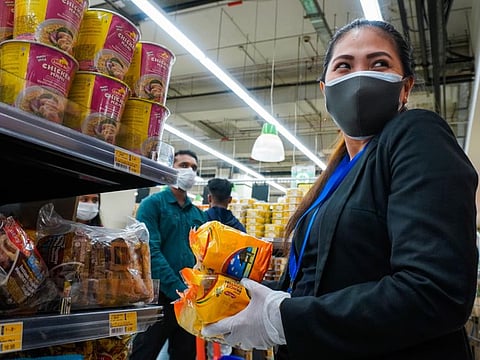Coronavirus: Why are some residents in the UAE still afraid to go out?
Just as adapting to life indoors was a struggle, going back out now is not proving easy

DUBAI: Najma is a 53-year-old housewife living in Downtown, Dubai. The easing of movement restrictions from April 24 has not changed the way she buys her groceries. Ever since the outbreak of coronavirus, she stopped going to her usual hypermarket in Karama, and instead has been making a weekly trip to the supermarket in her own building.
Even so, she says, “Buying groceries has become an expedition these days.”
Ask her why and she explains how it is a tedious, long-drawn process.
“Just the thought of all that I have to do puts me off – get into an old dress and pair of shoes, put on a mask, wear those rubbery gloves, carry two tissues to press the elevator button and worry sick about who I could bump into. Of course, the shopping comes with its own set of bizarre demands and when I get back, the drill is worse – having to deal with all that gear, clean the stuff that’s been bought, sanitise the packets and surfaces … seriously, the tasks are just endless. That’s why I hate stepping out of the house nowadays, but won’t order online either as I don’t want strangers coming to my doorstep.”
Out with the contact lenses, stick with the glasses
Elsewhere in an Al Jafaliya villa, Chirag Kisani, a 28-year-old engineer, talks of how he has given up his contact lenses for a pair of glasses, thanks to coronavirus. “I started wearing eye glasses as I believe they will keep my eyes better protected."
He says, "COVID-19 has instilled so much fear in us that there is no joy in going out – forget wearing the masks and gloves, which can be easily discarded when you’re back home, it’s such a pain to ensure your shoes are sprayed with sanitiser, clothes go into a separate bag for wash and you shower after every trip out,” he says.
To fight or take flight, approach or avoid?
Preventive care or paranoia, whichever way you look it, there are any number of UAE residents out there who are not ready to venture out of their homes still, and if they have no choice, will do whatever it takes – and more – to protect themselves from the virus.
Dr Fabian Saarloos, clinical psychologist at German Neuroscience Centre, puts this in perspective.

He says, “Evolutionarily speaking, our brains have been developed for adaptation to the environment in order to ensure our survival, and when confronted with uncertainty, respond with what is called the fight-or-flight reaction, which can also be termed as approach-avoid reaction. Whether to actively engage with the situation (approach, fight) or passively submit to the situation (avoid, flight) depends on the way we interpret ourselves versus the environment. These interpretations in turn are derived through our genetics and our experiences. Now stored in memory, they consciously as well as unconsciously drive our behaviour when confronted with uncertain or unsafe stimuli.”
The new reality – a six-week adjustment

Dr Saliha Afridi, clinical psychologist and managing director of the LightHouse Arabia Centre for Wellbeing, says people are afraid to go out because they feel the time is still not right. “The pandemic fear is still present and the government is also suggesting we do not go out unless necessary. People realise that the movement restrictions have been relaxed because of Ramadan, not because it is completely safe to go out,” she says.
According to her, “It is not psychological— it’s a real threat to their physical safety. And many people have psychologically adjusted to a new reality which is to stay home, and go out to get only the essentials.”
She said it takes six weeks (40 days) for a human to adjust to a new reality. “And just as we may have struggled to adapt changing our life to stay indoors, now we will struggle with going back outdoors with a different set of requirements. I also think that when we do go back out, people will mourn the loss of the freedom and ease of movement and how things used to be before we went indoors, because the world we will go back into is going to be very different from the world we left six weeks ago.”
When hyper-vigilance turned habitual
The coronavirus pandemic is a unique crisis experience for residents. As Dr Saarloos explains, “It cannot be compared to natural disasters such as earthquakes or say, the 9/11 attacks as these situations were single events occurring at a specific location with a clear beginning and an end, and direct consequences on the victims.”
From a trauma perspective, he says, the pandemic is much worse in the sense that the virus or aggressor is spreading invisibly and not limited to a specific location or time, especially since we have not found a cure yet and there is still no end in sight.
“With increasing numbers of infections and deaths, our exposure to excessive information about the pandemic (through media coverage), people’s reactions to the situation and societal measures to contain the spread, our sense of insecurity, as well as our lack of control, is increasing more slowly, but more dramatically than in the case of a single traumatic event. The brain remains in a state of alertness and hyper-vigilance, including the fight-or-flight reactions, thus leading to an increase in anxiety and also physical complaints, and eventually gets habituated to this state,” he reasons.
Also, in an attempt to regain control over the situation on an interpretative level, he notes: “The brain will have to grieve over our loss of safety, and in this grief process will have to go through the stages of denial, bargaining, anger, anxiety, depression, before accepting the new status quo and adapting to it.”
But can this fear be overcome?
Yes, says Camilla Iman, a 42-year-old influencer in Dubai, who is making a conscious effort to conquer the fear. “It’s hard, but we should learn to do it. After all, how long can we stay at home? No work, no pay, it’s as simple as that.”
She says she is slowly venturing out, but keeping well within the limits prescribed by the authorities and making sure she takes all necessary precautions like wearing masks, gloves and also practising social distancing.
“What bothers me more is that COVID-19 has changed us as human beings. Being afraid to go out is one thing, but being judgmental about it is another matter. We have become paranoid, discriminatory and even racist at times about it. And that’s not a good thing,” she points out.
A question of regaining liberties, trust
The psychologists say exercising caution with a sense of balance is the key.
They say people should not over-estimate their sense of safety just because some restrictions have been lifted. “The danger - the virus - is still as unpredictable and invisible as it was before, so precautions such as mask/gloves and social distancing are still valid, as well as “crowd control”. Certain practices of hygiene (like regularly washing hands with water and soap) should have been integrated into our normal habits anyways. Just stick to the rules and you’ll be fine,” says Dr Sarloos.
“Nevertheless, with regard to going out, for what it’s worth, people should enjoy the regained liberties after having learnt its value during the stay-in. So despite not going to festivals, just having a stroll through the park or walking along the beach, activities which we may have taken for granted before now have become more significant and thus should be consciously enjoyed as such. As we slowly regain our trust in the environment, but also realise our personal sense of control (and self-confidence) in dealing with the crisis and the virus, and one another too, we will adapt and survive. Also, people should be more aware and proud of the value of society, as the UAE and its residents have done a great job in coping and continuing to deal with the crisis,” he adds.







